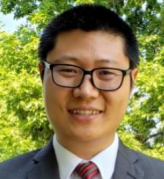MSE 690 Seminar: Dr. Zhenhua Zeng
| Event Date: | February 21, 2025 |
|---|---|
| Speaker: | Zhenhua Zeng |
| Speaker Affiliation: | Davidson School of Chemical Engineering & Tarpo Department of Chemistry, Purdue University |
| Time: | 3:30 PM |
| Location: | ARMS 1010 |
| Priority: | No |
| School or Program: | Materials Engineering |
| College Calendar: | Show |
 Dr. Zhenhua Zeng—Research Scientist at the Davidson School of Chemical Engineering & Tarpo Department of Chemistry, Purdue University
Dr. Zhenhua Zeng—Research Scientist at the Davidson School of Chemical Engineering & Tarpo Department of Chemistry, Purdue University
Abstract: Hydrogen energy through the electrochemical oxygen circle is a green route toward net-zero emission. That is, by using renewable energy, water electrolysis splits water and generates green hydrogen for fuel cells. Then, fuel cells directly generate electricity for fuel cell vehicles and other applications. To make energy conversion more and more efficient, we need to design and engineer catalytic materials (catalysts) with higher and higher activity for those sluggish half-reactions, i.e., the oxygen reduction reaction (ORR) in fuel cells, and the oxygen evolution reaction (OER) in water electrolysis. For ORR in fuel cells, while the design principles of new catalysts have been well-studied, such as the ligand effects and the strain effects, it remains elusive regarding how to engineer catalysts based on those design principles. For OER in water electrolysis, however, the design principles are even unclear, which makes catalyst engineering a greater challenge.
For the ORR in hydrogen fuel cells, I will demonstrate how to use the strain effects to engineer catalysts with improved performance. Specifically, I will show how strain can be generated through surface stress release, i.e., forming elastic 2D nanosheets and/or stepped (defected) surfaces. I will provide strategies to enhance ORR activity by leveraging this effect, such as varying terrace widths of stepped surfaces,1adjusting the thickness of 2D nanosheets2or controlling external stress.3
For OER in water electrolysis, I will provide direct atomic-scale insights into their crystal structures and structural transformations of Ni-based oxyhydroxide catalysts, shedding light on unique active sites: synergistic dual-metal reaction centers. There centers are characterized by switching active sites during OER, and through simple surface Fe doping and the formation of dual Fe-Fe center, they increase OER activity by over two orders of magnitude. This fundamental understanding not only elucidates the high OER activity of Ni (oxy)hydroxides with Fe-doping,4but also provides principles for engineering OER catalysts with further improved performance.5, 6
1. Liu, G.; Shih, A. J.; Deng, H.; Ojha, K.; Chen, X.; Luo, M.; McCrum, I. T.; Koper, M. T. M.; Greeley, J.; Zeng, Z. Nature 2024, 626, (8001), 1005-1010.
2. Wang, L.; Zeng, Z.; Gao, W.; Maxson, T.; Raciti, D.; Giroux, M.; Pan, X.; Wang, C.; Greeley, J. Science 2019, 363, (6429), 870-874.
3. Sawant, K. J.; Zeng, Z.; Greeley, J. P. Angew. Chem., Int. Ed. 2024, 63, (5), e202312747.
4. Dionigi, F.; Zeng, Z.; Sinev, I., et al. Nature Communications 2020, 11, (1), 2522.
5. Dionigi, F.; Zhu, J.; Zeng, Z.; Merzdorf, T.; Sarodnik, H.; Gliech, M.; Pan, L.; Li, W.-X.; Greeley, J.; Strasser, P. Angew. Chem., Int. Ed. 2021, 60, (26), 14446-14457.
6. Klingenhof, M.; Trzesniowski, H.; Koch, S.; Zhu, J.; Zeng, Z.; Metzler, L.; Klinger, A.; Elshamy, M.; Lehmann, F.; Buchheister, P. W.; Weisser, A.; Schmid, G.; Vierrath, S.; Dionigi, F.; Strasser, P. Nature Catalysis 2024, 7, (11), 1213-1222.
Biography: Dr. Zeng is a research scientist in the David School of Chemical Engineering and an incoming research faculty in the Tarpo Department of Chemistry at Purdue University. He works closely with the U.S. Department of Energy, academic collaborators and industry partners, such as 3M, GM, Honda and Toyota to advance zero-emission and clean energy technology. His research focuses on first-principles-based modeling of metal-metal interfaces, metal-oxide interfaces, oxide-oxide interfaces, and their applications in hydrogen fuel cells, water electrolysis, CO2 electrochemical reduction, and batteries, among others. Dr. Zhenhua Zeng obtained a BS degree in Applied Physics and a Master’s degree in Materials Science from Hunan University (China). He obtained his Ph.D. degree in Physical Chemistry from the Dalian Insitute of Chemical Physics, the Chinese Academy of Sciences. He had his first postdoctoral training at the Technical University of Denmark. Then, he moved to Argonne National Laboratory. Dr. Zeng has published ~60 peer-reviewed papers (8000+ citations), including those in Nature and Science as a corresponding author. He has supervised over 20 postdocs, graduate students, undergraduate students, and high school students. He was a winner of the 2019-2020 ECS Toyota Young Investigator Fellowships
2025-02-21 15:30:00 2025-02-21 16:30:00 America/Indiana/Indianapolis MSE 690 Seminar: Dr. Zhenhua Zeng Materials (Catalysts) Engineering in Fuel Cells and Water Electrolysis: A DFT Perspective ARMS 1010
